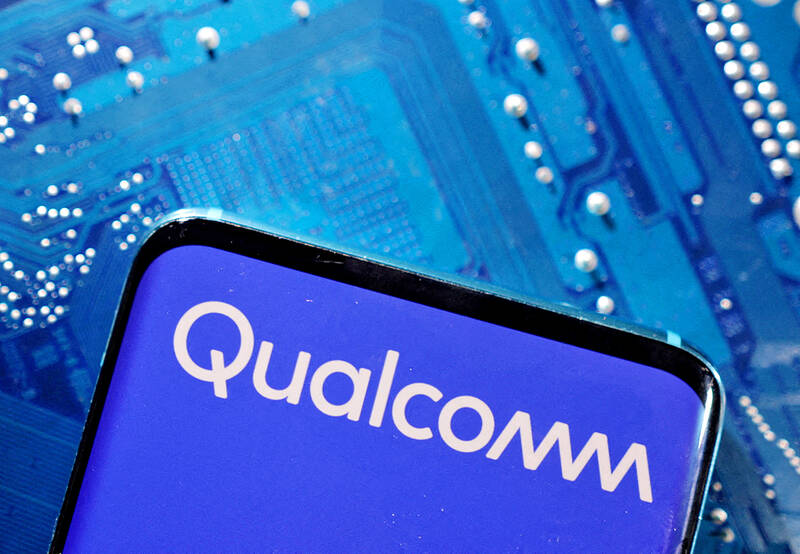Qualcomm Inc and Arm Holdings PLC, two chip companies heavily dependent on the smartphone market, on Wednesday delivered earnings reports that showed an industry making a wobbly comeback.
Both companies pointed to a resurgence in demand for high-end model devices, but stopped short of signaling that the broader industry was on solid ground.
The return of consumer spending on expensive handsets, particularly in China, helped both companies’ revenue and profit top analysts’ estimates last quarter.

Photo: Reuters
Expansion into new areas also shored up results. Qualcomm and Arm are pushing deeper into computing, bringing a boost from artificial intelligence spending, while Qualcomm has made a successful foray into automotive chips.
The two companies — longtime partners that have increasingly become adversaries — are seen as bellwethers for the smartphone industry. Qualcomm is the biggest seller of the processors that power the devices, and Arm developed much of the underlying technology used by the industry.
For the coming year, Qualcomm is predicting that overall phone units would grow roughly 5 percent or less — a sign it is not anticipating a wide recovery. Many consumers are not upgrading their devices as often, a problem that has plagued much of the industry.
Arm projected revenue of US$920 million to US$970 million for the December quarter. The midpoint of that range would fall short of the US$950.9 million that analysts had estimated.
Qualcomm expects sales of US$10.5 billion to US$11.3 billion during the period. Analysts estimated US$10.5 billion on average, according to data compiled by Bloomberg. Profit, minus certain items, would be as much as US$3.05 a share, beating Wall Street projections.
The automotive market was a bright spot for Qualcomm, despite a slump in that category that has hurt other chipmakers. Revenue was up 55 percent in fiscal this year. The San Diego-based company said that it has been winning new business, helping it outshine peers.
“I think you should look at our revenue in auto less sensitive to what happens in the market, much more related to new models that are being launched,” Qualcomm chief executive officer Cristiano Amon said on a conference call with analysts. “It’s reflecting a shifting share.”
In the September quarter, Qualcomm’s profit was US$2.69 a share, excluding some items. Revenue rose 19 percent to US$10.2 billion. Analysts had estimated earnings of US$2.56 a share and sales of US$9.91 billion.
At Arm, revenue during the period rose about 5 percent to US$844 million. That compares with the US$810.9 million analysts had projected. Earnings were US$0.30 a share, excluding some items. Analysts had estimated US$0.26 on average, according to data compiled by Bloomberg.

The US dollar was trading at NT$29.7 at 10am today on the Taipei Foreign Exchange, as the New Taiwan dollar gained NT$1.364 from the previous close last week. The NT dollar continued to rise today, after surging 3.07 percent on Friday. After opening at NT$30.91, the NT dollar gained more than NT$1 in just 15 minutes, briefly passing the NT$30 mark. Before the US Department of the Treasury's semi-annual currency report came out, expectations that the NT dollar would keep rising were already building. The NT dollar on Friday closed at NT$31.064, up by NT$0.953 — a 3.07 percent single-day gain. Today,

‘SHORT TERM’: The local currency would likely remain strong in the near term, driven by anticipated US trade pressure, capital inflows and expectations of a US Fed rate cut The US dollar is expected to fall below NT$30 in the near term, as traders anticipate increased pressure from Washington for Taiwan to allow the New Taiwan dollar to appreciate, Cathay United Bank (國泰世華銀行) chief economist Lin Chi-chao (林啟超) said. Following a sharp drop in the greenback against the NT dollar on Friday, Lin told the Central News Agency that the local currency is likely to remain strong in the short term, driven in part by market psychology surrounding anticipated US policy pressure. On Friday, the US dollar fell NT$0.953, or 3.07 percent, closing at NT$31.064 — its lowest level since Jan.

The New Taiwan dollar and Taiwanese stocks surged on signs that trade tensions between the world’s top two economies might start easing and as US tech earnings boosted the outlook of the nation’s semiconductor exports. The NT dollar strengthened as much as 3.8 percent versus the US dollar to 30.815, the biggest intraday gain since January 2011, closing at NT$31.064. The benchmark TAIEX jumped 2.73 percent to outperform the region’s equity gauges. Outlook for global trade improved after China said it is assessing possible trade talks with the US, providing a boost for the nation’s currency and shares. As the NT dollar

The Financial Supervisory Commission (FSC) yesterday met with some of the nation’s largest insurance companies as a skyrocketing New Taiwan dollar piles pressure on their hundreds of billions of dollars in US bond investments. The commission has asked some life insurance firms, among the biggest Asian holders of US debt, to discuss how the rapidly strengthening NT dollar has impacted their operations, people familiar with the matter said. The meeting took place as the NT dollar jumped as much as 5 percent yesterday, its biggest intraday gain in more than three decades. The local currency surged as exporters rushed to